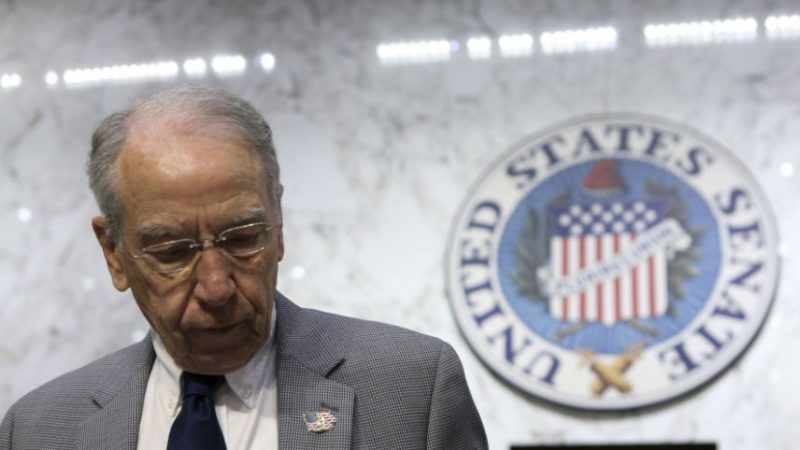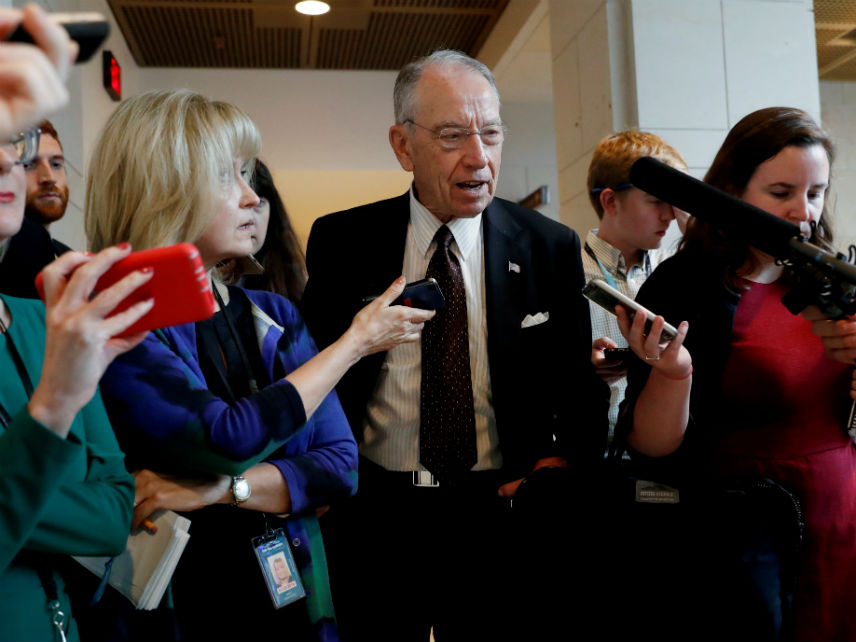The Return of Criminal Justice Reform
Congress failed to pass a bill reforming mandatory minimums last year; now two senators want to try again.


Two senators announced today that they will reintroduce a bipartisan bill to overhaul federal sentencing guidelines. The legislation failed to pass Congress last year, much to the disappointment of criminal justice reform groups.
The Sentencing Reform and Corrections Act, originally introduced by Sens. Chuck Grassley (R-Ia.) and Dick Durbin (D-Il.) in 2015, would reduce the mandatory-minimum sentencing guidelines for repeat drug offenders without serious violent felonies and would broaden the "safety valve" exception to federal mandatory minimum sentences. It would also add new mandatory minimum sentences for interstate domestic abuse and for providing support for terrorists, while strengthening penalties for certain other crimes.
Grassley and Durbin say they will reintroduce the bill this year, although they did not say when.
"While the political landscape in Washington has changed, the same problems presented by the current sentencing regime remain," Grassley said in a statement, "and we will continue to work with colleagues in Congress and the administration, as well as advocates and members of the law enforcement community, to find a comprehensive solution to ensure justice for both the victims and the accused, and support law enforcement in their mission to keep our communities safe."
The legislation was hammered out in 2015 and then revised again in 2016 as part of a compromise between skeptical Republicans, like the traditionally law-and-order Grassley, and a bipartisan group of Democrats and Republicans who support reducing or eliminating mandatory minimum sentencing guidelines.
Criminal justice reform advocates saw the bill as their best chance in years to get a major piece of legislation through Congress, but despite passing the Republican-controlled Senate Judiciary Committee the bill never made it to the Senate floor for a vote.
Senate Majority Leader Mitch McConnell (R-Ky.), facing opposition to the bill from within his caucus, said he was waiting on the House to pass a package of similar legislation first. Speaker of the House Paul Ryan (R-Wisc.) said he was committed to bringing that package to the floor—but in the midst of a bitter election year, as well as disputes with Democrats over some provisions in the House bill, neither chamber of Congress found the will or time to bring the legislation to a full vote.
Reformers' disappointment was compounded when President Donald Trump tapped Jeff Sessions to be attorney general. As a senator, Sessions was one of a small but vocal group of Republicans who staunchly support mandatory minimum sentencing and 1980s-style law enforcement.
Yet Jared Kushner, Trump's son-in-law and all-around White House point man, has been meeting privately with senators, including Durbin and Grassley, to discuss criminal justice reform. The subject is reportedly one of Kushner's areas of personal interest—his father was sentenced to two years in federal prison for tax evasion—and last week he hosted a bipartisan meeting on improving job training and re-entry programs for federal inmates. Kushner's support could provide valuable political cover for Republicans.
"This legislation is the product of more than five years of work on criminal justice reform," Durbin said in a statement. "It's also the best chance in a generation to right the wrongs of a badly broken system. The United States incarcerates more of its citizens than any other country on earth. Mandatory minimum sentences were once seen as a strong deterrent. In reality they have too often been unfair, fiscally irresponsible and a threat to public safety."
Editor's Note: As of February 29, 2024, commenting privileges on reason.com posts are limited to Reason Plus subscribers. Past commenters are grandfathered in for a temporary period. Subscribe here to preserve your ability to comment. Your Reason Plus subscription also gives you an ad-free version of reason.com, along with full access to the digital edition and archives of Reason magazine. We request that comments be civil and on-topic. We do not moderate or assume any responsibility for comments, which are owned by the readers who post them. Comments do not represent the views of reason.com or Reason Foundation. We reserve the right to delete any comment and ban commenters for any reason at any time. Comments may only be edited within 5 minutes of posting. Report abuses.
Please to post comments


"Criminal Justice reform" is just code for more government power.
Reform tends to imply fixing for the better and rarely, if ever, does that happen in government.
Indeed, hopefully the new legislation will provide for enhanced punishments as a means for protecting academic reputations, regardless of any "international standards" in this regard under Article 19 of the so-called "International Covenant on Civil and Political Rights." Surely no one here would dare to defend the "First Amendment dissent" of a single, isolated judge in America's leading criminal "satire" case? See the documentation at:
http://raphaelgolbtrial.wordpress.com/
"This legislation is the product of more than five years of work on criminal justice reform," Durbin said in a statement. "It's also the best chance in a generation to right the wrongs of a badly broken system. The United States incarcerates more of its citizens than any other country on earth. Mandatory minimum sentences were once seen as a strong deterrent. In reality they have too often been unfair, fiscally irresponsible and a threat to public safety."
Yeah but it's good for business, and "fixing" the problem is hard.
It would also add new mandatory minimum sentences for interstate domestic abuse and for providing support for terrorists, while strengthening penalties for certain other crimes.
I give you the only parts that will remain in the finished product.
Because I am an idiot I had to read it twice before I realized "providing support for terrorists" was a crime and they weren't saying the law would add ways to provide support for terrorists.
So...I'm not afraid to ask the dumb question: what is the hell is "interstate" domestic abuse? Is that abusing a family member on an airplane?
As a fellow driver (assuming your name is not just a filthy lie) you should know. It's when you hit your spouse with a car on the freeway.
"Repeat drug offenders without serious violent felonies...."
This is an empty gesture if everyone who has a gun *somewhere* in their vehicle or apartment is automatically deemed a "serious violent felon" even if they don't actually use a gun.
Maybe I am wrong, and folks carrying large amounts of cash will start to protect themselves with sticks and witty insults, but how would this move the needle if it only applies to "nonviolent" felons and the law views practically all drug dealers as "violent."
A lot of politics is just redefining categories so that they play well in the media.
If Congress actually used evidence in making decisions, criminal justice reform would actually not be that difficult. All they would have to do is write a law that forbids background checks from any source and for any purpose (including the zillion licenses that require it) past ten years similar to bankruptcy and other major credit issues. Combine that with getting rid of these ridiculous unconstitutional offender registries and watch things change.
I personally reviewed studies that show the rate of incarceration over time. At the same time, I researched the change in company practices regarding background checks. There is more than just a strong correlation between the timing of the practices and the overwhelming increase of crime. I conclude there is definitely a causation.
Jurors should always know if there are mandatory minimum sentences involved, but often this is hidden from them by the courts. Always assume that the court is hiding things from you, as a juror, and realize that if a criminal case comes to court even with overwhelming evidence of guilt, that it may be because they have nothing to lose. Then ask yourself if life in prison is appropriate before voting on guilt or not guilt. I know jurors who regret their votes because they had no idea the penalty for a non-violent "crime" was higher than for murder.